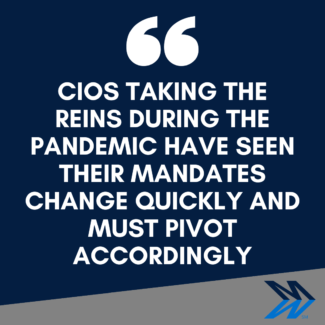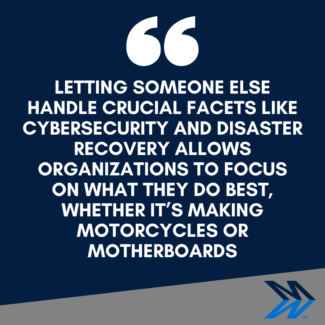November 5, 2020
More than any disruption in a century, the COVID-19 pandemic is causing dramatic shifts in the way companies do business. This being the digital age, many of those shifts necessitate new or enhanced technology that serves both workers and customers. It’s no surprise, then, that the already numerous responsibilities of Chief Information Officers continue to mount.
 “CIOs taking the reins during the pandemic have seen their mandates change quickly and must pivot accordingly,” author and IT leadership expert Tony Gerth wrote in Forbes. Even though there may not be resources for “broad, sweeping change,” he added, that does not preclude maintaining stability and growth. “The focus is more likely on keeping the business running in the most efficient manner possible.”
“CIOs taking the reins during the pandemic have seen their mandates change quickly and must pivot accordingly,” author and IT leadership expert Tony Gerth wrote in Forbes. Even though there may not be resources for “broad, sweeping change,” he added, that does not preclude maintaining stability and growth. “The focus is more likely on keeping the business running in the most efficient manner possible.”
An Enterprises Project article published this past summer was more specific. “The crisis,” wrote business and technology reporter Stephanie Overby, “has crystallized the significant shift in the CIO role that was already underway from technology leader to cross-functional business leader.” Among other things, the story noted, that means being highly adaptable; taking charge of customer service and employee engagement; recruiting a “strong bench” of IT talent; and developing “quality, meaningful relationships with other business units.”
During a time when so much business is conducted online (due in large part to remote workforces), it is vitally important for CIOs to increase their knowledge of and play a more central role in cybersecurity. Because more people are working at home than ever before, countless outdated wireless networks and unprotected personal devices (phones, tablets, laptops) are vulnerable to attacks — and cybercrooks are happy to take full advantage. That’s why CIOs must have an intimate understanding not only of their company’s IT infrastructure, but how even a minor breakdown in that infrastructure might effect the business side if something goes awry. And despite the best proactive efforts, chances are something will go awry. It’s possible, though, to significantly minimize the impact. Adequate preparation that melds technological vigilance with employee education can mean the difference between a temporary setback and catastrophic failure.

For smaller companies without an in-house CIO, or that lack the training resources to provide workers with additional skill sets, managed services providers (MSPs) are often a more feasible way to fill gaps and cover bases — especially when it comes to all things IT-related. Letting someone else handle crucial facets like cybersecurity and disaster recovery allows organizations to focus on what they do best, whether it’s making motorcycles or motherboards. Or molding minds.
 According to EdScoop, the MSP model is taking hold in segments that have historically managed things in-house. Upper-level academia, for example, has over the decades become increasingly business-like in the way it operates financially, technologically and otherwise. “Until recently, most college and university technology departments were able to operate and maintain the infrastructure and systems their schools relied upon,” an October 2020 story explained. “But the rapid evolution of cloud services, SD-WAN and mobile networks, APIs, containers and AI has created a more dynamic and complicated operating environment. Additionally, in today’s highly competitive marketplace, there simply isn’t enough talent to go around.”
According to EdScoop, the MSP model is taking hold in segments that have historically managed things in-house. Upper-level academia, for example, has over the decades become increasingly business-like in the way it operates financially, technologically and otherwise. “Until recently, most college and university technology departments were able to operate and maintain the infrastructure and systems their schools relied upon,” an October 2020 story explained. “But the rapid evolution of cloud services, SD-WAN and mobile networks, APIs, containers and AI has created a more dynamic and complicated operating environment. Additionally, in today’s highly competitive marketplace, there simply isn’t enough talent to go around.”
That dearth of talent includes CIOs. In-house or outsourced, the right ones — creative thinkers who play well with others across the board, can turn on a proverbial dime, and see growth opportunities where none previously existed — make the difference between not just surviving but actually thriving during these uncertain and turbulent times.
About Mindsight
Mindsight is industry recognized for delivering secure IT solutions and thought leadership that address your infrastructure and communications needs. Our engineers are expert level only – and they’re known as the most respected and valued engineering team based in Chicago, serving emerging to enterprise organizations around the globe. That’s why clients trust Mindsight as an extension of their IT team.
Visit us at http://www.gomindsight.com.

